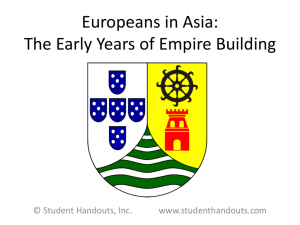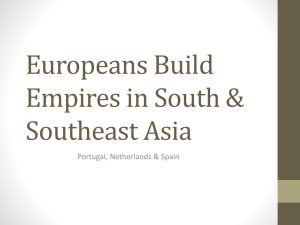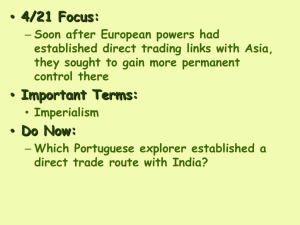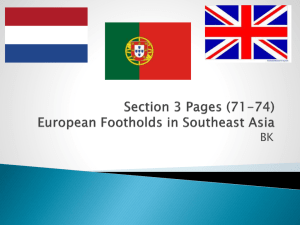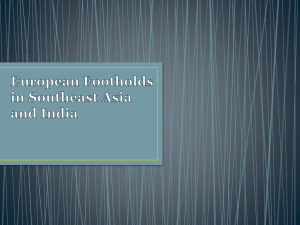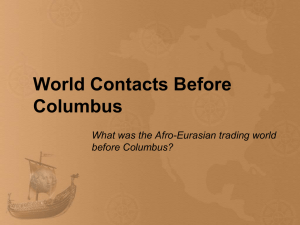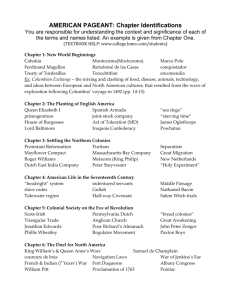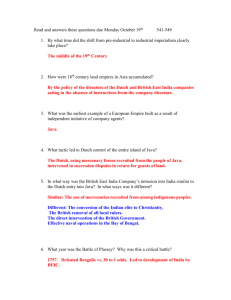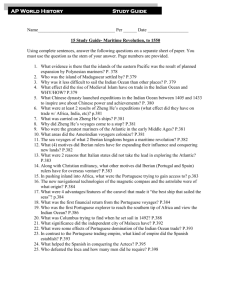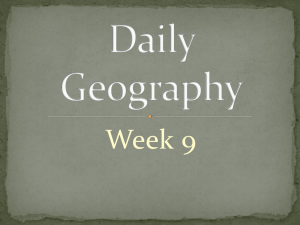P 333-441 What drove European involvement in the world of Asian
advertisement
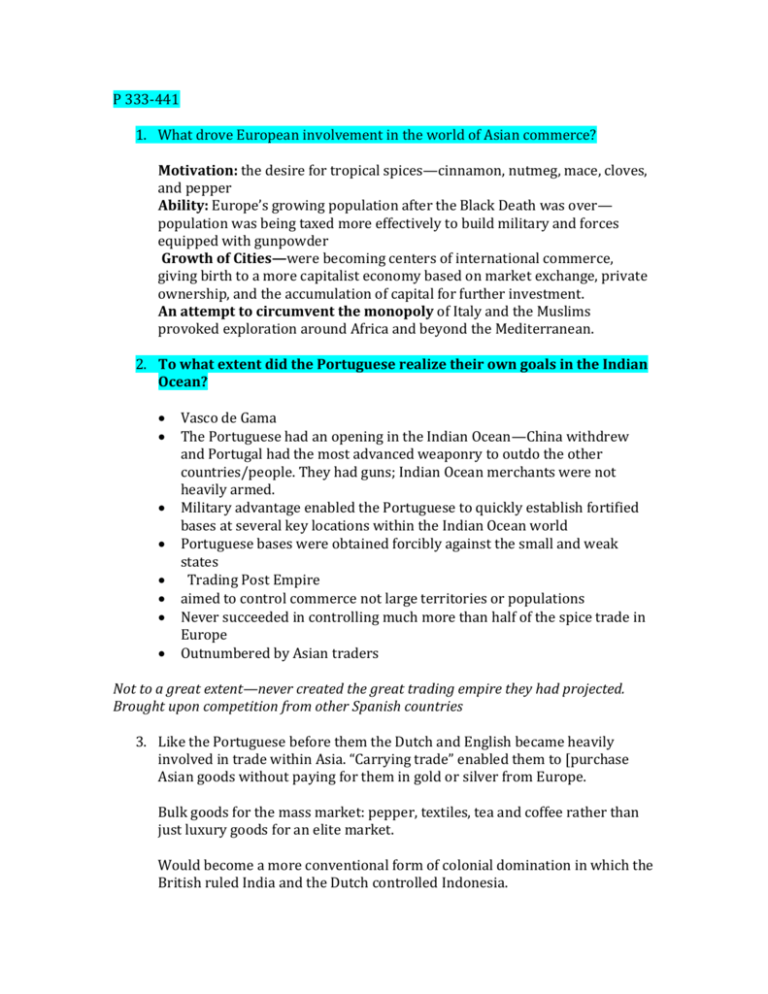
P 333-441 1. What drove European involvement in the world of Asian commerce? Motivation: the desire for tropical spices—cinnamon, nutmeg, mace, cloves, and pepper Ability: Europe’s growing population after the Black Death was over— population was being taxed more effectively to build military and forces equipped with gunpowder Growth of Cities—were becoming centers of international commerce, giving birth to a more capitalist economy based on market exchange, private ownership, and the accumulation of capital for further investment. An attempt to circumvent the monopoly of Italy and the Muslims provoked exploration around Africa and beyond the Mediterranean. 2. To what extent did the Portuguese realize their own goals in the Indian Ocean? Vasco de Gama The Portuguese had an opening in the Indian Ocean—China withdrew and Portugal had the most advanced weaponry to outdo the other countries/people. They had guns; Indian Ocean merchants were not heavily armed. Military advantage enabled the Portuguese to quickly establish fortified bases at several key locations within the Indian Ocean world Portuguese bases were obtained forcibly against the small and weak states Trading Post Empire aimed to control commerce not large territories or populations Never succeeded in controlling much more than half of the spice trade in Europe Outnumbered by Asian traders Not to a great extent—never created the great trading empire they had projected. Brought upon competition from other Spanish countries 3. Like the Portuguese before them the Dutch and English became heavily involved in trade within Asia. “Carrying trade” enabled them to [purchase Asian goods without paying for them in gold or silver from Europe. Bulk goods for the mass market: pepper, textiles, tea and coffee rather than just luxury goods for an elite market. Would become a more conventional form of colonial domination in which the British ruled India and the Dutch controlled Indonesia. Spain The first to challenge Portugal Established themselves in the Philippines Ferdinand Magellan The region was made up of chiefdoms Some involved in tribute with China Small scale military operations, gunpowder weapons, local alliances, gifts and favors to chiefs, and the pageantry of Catholic ritual contributed to eay and bloodless Spanish takeover of the islands A once scattered people shifted into the cities Tribute, taxes, unpaid labor became part of life Women who had previous role were replaced Short lived revolts Manila—the new capital of the colonial Philippines By 1600 it was a flourishing and culturally diverse city of more than 40,000 inhabitants. Hostility with the Chinese. Dutch entered Indian Ocean commerce in the early 17th century Militarily and economically stronger than the Portuguese Ventures were private with charters Focused on Indonesia Fragmented and weak political authority Sought to control the production of cloves, cinnamon, nutmeg, and mace Much bloodshed the Dutch seized control of the spice producing islands this is a contrast from the Spanish in the Philippines Local population had to trade only with the Dutch “on the Banda island.. the Dutch killed, enslaved, or left to starve virtually the entire population of 15,000. Replaced with Dutch planters monopolized nutmeg trade destroyed local communities Trade by Warfare spice British entered Indian Ocean commerce in the early 17th century Militarily and economically stronger than the Portuguese Ventures were private with charters Focused on India Less well financed Less commercially sophisticated Largely excluded from the Spice Islands. *Dutch monopoly Dealing with a strong establishment in the Mughal Empire Three major trading areas in India and control of Arabian Sea and Persian Gulf Secured trading bases with the permission of Mughal authorities or local rulers with bribes as an admission to the Indian markets. Indian cotton textiles 4. To what extent did the British and Dutch trading companies change the societies they encountered in Asia? Dutch—decimated populations. Local economy of he Spice Islands was shattered, and their people were impoverished British—could not just overcome the Mughal Empire . not trade by warfare. Secured trading bases with the permission of the Mughal authorities. Offered bribes for trade. Later both would rule their respective colonies. The European presence was far less significant in Asia than it was in the Americas or Africa during these centuries. European political control was limited to the Philippines and a few of the Spice Islands. To the great powers of South and East Asia—Mughal, China, Japan—Europe was no real military threat. Played minor roles in their large and prosperous economies. Japan—controlled European intruders. Tokugawa expelled European influence Asian merchants did not disappear Overland trade remained wholly in Asian hands and grew considerably. Christian merchants from Armenia were active in the overland commerce linking Europe and the Middle East and Central Asia. These commercial networks, equivalent in their sophistication to those of Europe, continued to operate successfully even as Europeans militarized the seaborne commerce of the Indian Ocean.
